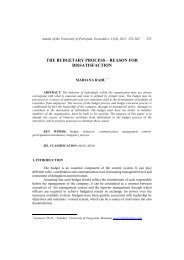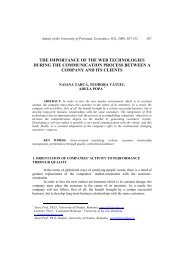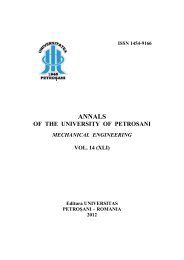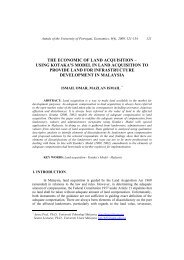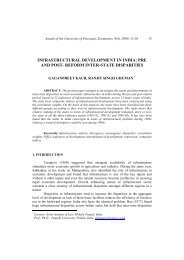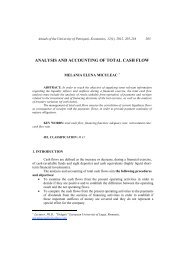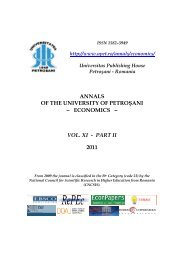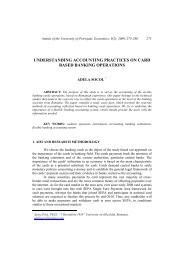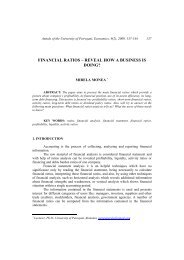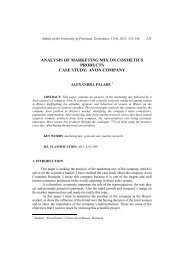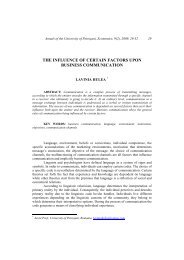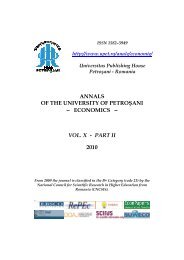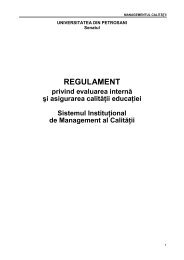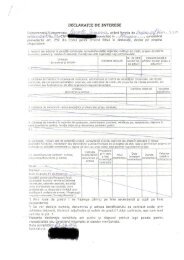annals of the university of petroÅani â¼ economics â¼ vol. xi - part i ...
annals of the university of petroÅani â¼ economics â¼ vol. xi - part i ...
annals of the university of petroÅani â¼ economics â¼ vol. xi - part i ...
You also want an ePaper? Increase the reach of your titles
YUMPU automatically turns print PDFs into web optimized ePapers that Google loves.
Internal Controls in Ensuring Good Corporate Governance in … 193<br />
On <strong>the</strong> necessary components <strong>of</strong> an effective internal control system, 69% <strong>of</strong><br />
<strong>the</strong> respondents identified <strong>the</strong> control environment, control activities, information<br />
communication, risk assessment and monitoring as <strong>the</strong> necessary components <strong>of</strong> an<br />
effective internal control system. Respondents indicated that control environment was<br />
<strong>the</strong> heart <strong>of</strong> effective control. An analysis <strong>of</strong> <strong>the</strong> responses revealed that control<br />
activities should include approvals, verifications, reconciliations, and reviews <strong>of</strong><br />
operating performance, security <strong>of</strong> assets and segregation <strong>of</strong> duties.<br />
All <strong>the</strong> respondents concurred on <strong>the</strong> definition <strong>of</strong> internal controls by<br />
Minnesota State Auditor (2007) which defined internal controls as policies and<br />
procedures designed to protect an institution from loss or misuse <strong>of</strong> its assets and also<br />
to ensure that all transactions are properly authorized and thus guarantee or foster good<br />
corporate governance. In addition to <strong>the</strong> aforesaid <strong>the</strong> respondents also indicated that:<br />
Poor capacity utilization<br />
Liquidity Crunch<br />
Poor capacity utilization<br />
Lack <strong>of</strong> resources both human and capital<br />
Poor data management<br />
Disintegration <strong>of</strong> systems across de<strong>part</strong>ments<br />
Stringent regulatory requirements could affect effectiveness <strong>of</strong> <strong>the</strong>ir internal<br />
control systems and hence corporate governance in <strong>the</strong> future<br />
Finally majority <strong>of</strong> <strong>the</strong> respondents indicated that although <strong>the</strong>re were internal<br />
control systems in most banks <strong>the</strong>ir effectiveness was affected by poor supervision<br />
from <strong>the</strong> body <strong>of</strong> directors and <strong>the</strong> reasons for poor supervision by <strong>the</strong> body <strong>of</strong><br />
directors ranged from multiple sitting on boards to what <strong>the</strong> respondents termed “fat<br />
cats” who set a <strong>the</strong> board for enriching <strong>the</strong>mselves at he expense <strong>of</strong> monitoring<br />
performance <strong>of</strong> subordinates. This <strong>the</strong>y resulted in poor corporate governance and<br />
subsequently poor performance <strong>of</strong> a bank indicating <strong>the</strong> positive correlation between<br />
effective internal controls and good corporate governance.<br />
7. DISCUSSION<br />
According to <strong>the</strong> base committee on banking supervision, focus is increasingly<br />
on <strong>the</strong> importance <strong>of</strong> internal controls to ensure good corporate governance. This<br />
heightened interest in internal controls has in <strong>part</strong> a result <strong>of</strong> significant losses incurred<br />
by several banking organizations. An analysis <strong>of</strong> <strong>the</strong> problems related to <strong>the</strong>se losses<br />
indicated <strong>the</strong>re could probably have been avoided had <strong>the</strong> banks maintained effective<br />
internal control systems (Financial Stability Board, 1998).<br />
Although most banks have effective internal controls, mediocrity <strong>of</strong> boards<br />
caused by selection on <strong>the</strong> basis <strong>of</strong> “olds boy club” ra<strong>the</strong>r than merit has seen <strong>the</strong>se<br />
boards fail for supervise chief executive <strong>of</strong>ficers effectively. That is why RBZ turned<br />
down <strong>the</strong> proposal to appoint Mr D Simba as an executive director at its licensing stage<br />
due to his glaring lack <strong>of</strong> pre-requisite academic and pr<strong>of</strong>essional qualifications as well<br />
as his questionable integrity.<br />
O<strong>the</strong>r factors such as lack <strong>of</strong> accountability due to <strong>the</strong>re no being separation <strong>of</strong><br />
ownership and control such as where an executive director is <strong>the</strong> majority shareholder.



